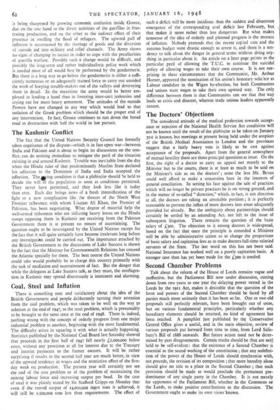Coal, Steel and Inflation
There is something neat and satisfactory about the idea of the British Government and people deliberately turning their attention from the coal problem, which was taken to be well on the way to solution at the end of 1947, to the steel problem, which is presumably to be brought to the same state at the end of 1948. There is, indeed, nothing wrong with the concept of orderly progress from one major industrial problem to another, beginning with the most fundamental. The difficulty arises in squaring it with what is actually happening. Statistics published by the National Coal Board last Saturday showed that proceeds in the first half of 1947 fell nearly £2,000,000 below costs, without any provision at all for interest due to the Treasury and interim payments to the former owners. It will be rather surprising if results in the second half year are much better, in view of the upward tendency in wages and the restrictive effect of the five- day week on production. The present year will certainly not see _ the end of the cost problem or of the problem of maintaining the mining labour force and increasing output per head. In the case of steel it was plainly stated by Sir Stafford Cripps on Monday that even if the record output of 14,000,000 ingot tons is achieved, it will still be 1,5oo,000 tons less than requirements. The effect of
such a deficit will be more insidious than the sudden and disastrous emergence of the corresponding coal deficit last February, but that makes it more rather than less dangerous. But what makes nonsense of the idea of orderly and planned progress is the menace of inflation. Nobody pretends that the recent capital cuts and the autumn budget were drastic enough to arrest it, and there is a ten- dency to talk about the danger in general terms without doing any- thing in particular about it. An article on a later page points to the particular _peril of allowing the T.U.C. to continue the suicidal policy of allowing wages to take their own course. It is not sur- prising in these circumstances that the Communist, Mr. Arthur Homer, approved the nomination of his union's honorary solicitor as Labour candidate in the Wigan by-election, for both Communists and unions want wages to take their own upward way. The only difference between them is that Communists can see that that way leads to crisis and disaster, whereas trade unions leaders apparently cannot.


































 Previous page
Previous page